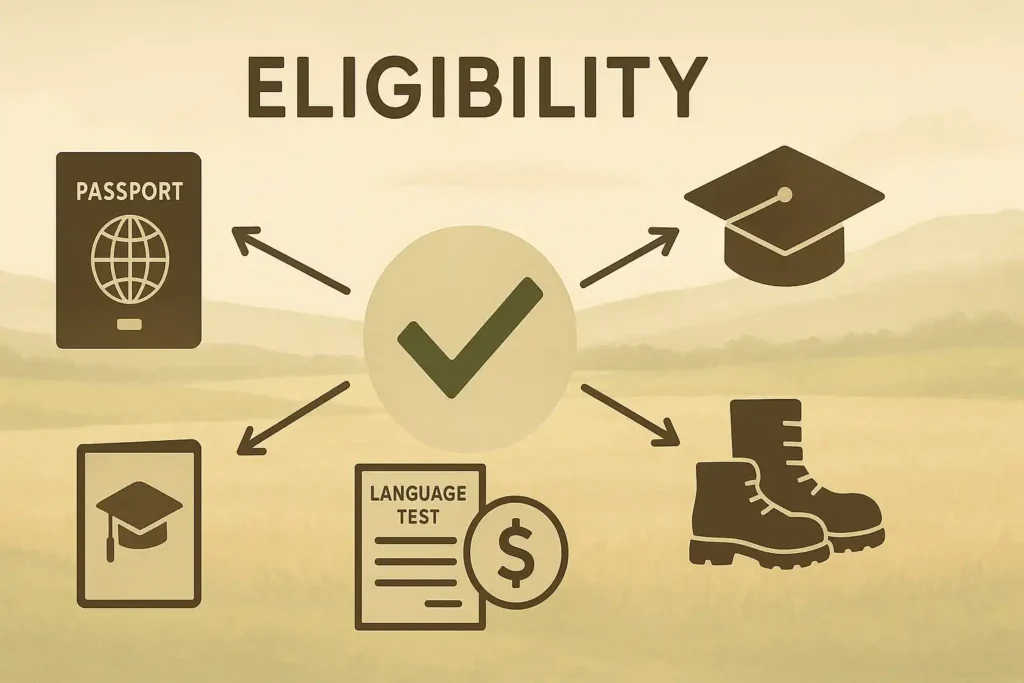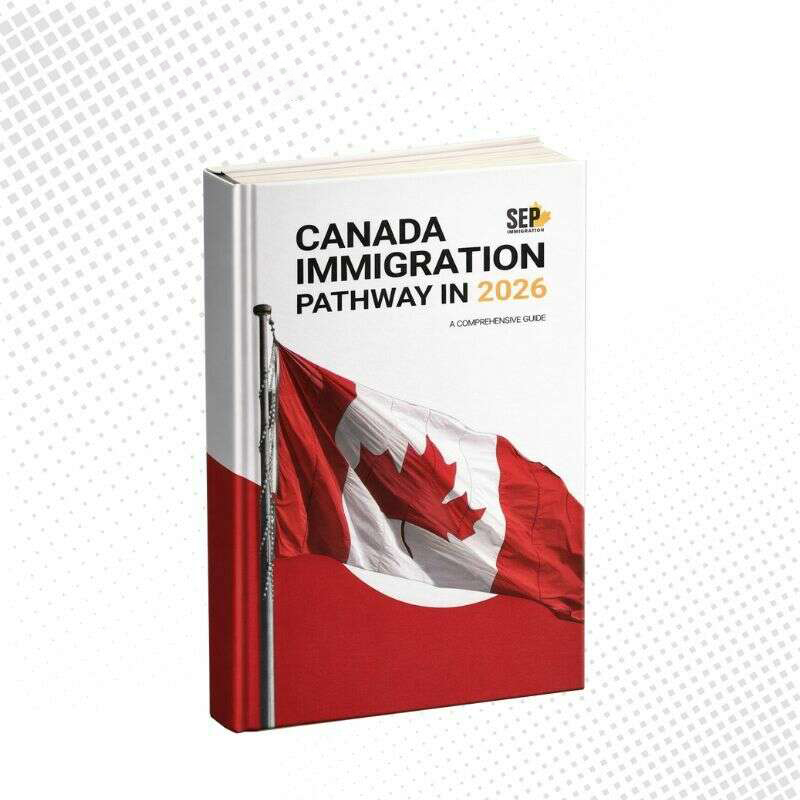Canada introduced the Rural Community Immigration Pilot (RCIP) in 2025 to help smaller towns and remote regions bring in skilled workers. The program gives employers in participating communities the chance to fill jobs that are difficult to staff locally, while also opening a path to permanent residence for foreign workers.
In this article, you’ll learn what RCIP is, how it benefits both applicants and communities, who can apply, which documents are needed, and the steps to complete the application process.
What is the Rural Community Immigration Pilot (RCIP)?
The Rural Community Immigration Pilot, often shortened to RCIP, is a federal immigration program that began in January 2025. It replaced the earlier Rural and Northern Immigration Pilot (RNIP), which had been running since 2019. The goal is clear: connect employers in rural or remote parts of Canada with foreign workers who have the skills they need but cannot easily find within the local labour pool.
A total of 14 communities were selected to take part. Each of them can recommend applicants for permanent residence once a genuine job offer has been made.
Immigration, Refugees and Citizenship Canada (IRCC) manages the program at the federal level, but the communities themselves play an important role by reviewing applications, recommending candidates, and keeping their employer lists up to date.

Benefits of the RCIP for Applicants and Communities
Let’s look separately at what the program offers to applicants and to the communities that take part:
Advantages for Skilled Workers
For individuals considering RCIP, the program offers several advantages beyond a simple job offer. These include opportunities for permanent settlement, recognition of education and work history, and a closer connection with the community they plan to join.
Key benefits for workers include:
- Pathway to permanent residence: RCIP provides a clear route for foreign nationals with a valid job offer in one of the participating communities to apply for PR.
- Flexibility in work experience: Most applicants need at least one year (1,560 hours) of relevant paid work within the last three years. However, some international students who studied in the same community may qualify without that requirement.
- Language and education recognition: Applicants must take an approved test in English or French. The score needed depends on the NOC level of the job offer. Education is validated through Canadian credentials or an Educational Credential Assessment (ECA) if completed abroad.
- Community recommendation: Each application goes through the community, which issues a recommendation for candidates it believes are a good fit. This adds a layer of local support and connection that other federal pathways do not have.
Advantages for Employers and Local Communities
RCIP is also structured to address the long-standing problem of unfilled jobs in smaller towns. By letting communities select designated employers and recommend workers, the pilot gives more control to local organizations that understand their labour market needs best.
Key benefits for employers and communities include:
- Access to workers in needed fields: Employers can fill positions in areas like health care, trades, hospitality, and food processing where local candidates are often limited.
- Employer designation system: Only businesses approved as “designated employers” can hire through RCIP. This ensures that the job offers are genuine and reflect real labour needs.
- Population growth in smaller towns: Communities gain new residents who contribute not only to the workforce but also to schools, housing demand, and local services.
- Strengthened community role: Unlike some federal programs, RCIP allows local economic development groups to help decide which employers participate and which candidates move forward. This increases accountability and keeps the program tied to real community needs.
Designated Employers List
Communities that participate in RCIP publish their own lists of “designated employers.” These are businesses approved under both federal and local rules. Only jobs offered by such employers qualify for recommendation under RCIP.
Below are what it takes to become designated, followed by examples (including Brandon).
What it means to be a designated employer
- A designated employer is one that has received formal approval to offer eligible jobs under RCIP in a participating community.
- Only designated employers can issue valid job offers that may lead an applicant to get the community’s recommendation.
- Having designation doesn’t guarantee there are open jobs or that all candidates will meet the eligibility criteria.
Criteria for employer designation
To gain designation, employers generally must satisfy both federal and local standards, such as:
- They must operate in the relevant community for a minimum duration (often two years).
- Their business activities should fall within priority sectors defined by that community.
- The majority of their operations (for example, ≥ 75%) should occur within the community’s geographic limits.
- They have to comply with labour laws, health & safety regulations, and have clean records in those areas.
- They should commit to supporting the newcomer and their family’s settlement in that community (helping with orientation, services etc.).
- They might be required to complete training related to employer or workplace standards (e.g. “welcoming workplace” training).
| Community | Some Designated Employers | Source |
| Brandon, Manitoba | • Saputo Dairy Products Canada G.P.• Koch Fertilizer Canada, ULC• Gateway Mechanical Services Inc.• Keller Developments | Economic Development Brandon – RCIP List of Designated Employers (Economic Development Brandon) |
| West Kootenay, British Columbia | • Ancron Medical Services (Nelson)• CareCorp (Mountain Lake Village)• Castleview Care Centre (Castlegar)• Misha Zibin Society (Grand Forks)• Pharmasave Creston• Trail Association for Community Living | West Kootenay RCIP – Designated Employers (westkootenayimmigration.ca) |
| Altona / Rhineland, Manitoba | • Elmer’s Welding & Manufacturing Ltd.• Greenvalley Equipment (2009) Inc.• Buffalo Creek Mills (2017) Inc.• Kiddie Sunshine Centre Inc.• Subway, Altona• Pioneer Meats Ltd.• ETG Commodities Inc.• Access Credit Union Ltd. | Altona/Rhineland RCIP – List of Designated Employers (ared-rpga.com) |
| Timmins (Regional), Ontario | • Anson General Hospital• Bingham Memorial Hospital• Blanche River Health• Extendicare (Haileybury, Kapuskasing, Kirkland Lake, Timmins)• Many long-term care homes, child care centres, hospitals and transport, trade businesses | Timmins Regional RCIP-FCIP – Designated Employer List (timminsedc.com) |
| North Okanagan-Shuswap, British Columbia | • Axis Family Resources Ltd.• Canadian Mental Health Association• Kids Kingdom Childcare Society• Christian Home e-School• Rogers Foods Ltd.• Tolko Industries Ltd.• Sunshine Traders Ltd.• Gateway Car Wash | North Okanagan-Shuswap RCIP – Designated Employer List (May 2025) (RCIP North Okanagan-Shuswap) |
| Sault Ste. Marie, Ontario | • Algoma Tubes Inc (Tenaris Canada)• Meadow Park Montessori School (not currently hiring)• Sault Area Hospital• VIA-CORE• Extendicare Mapleview, etc.• A number of restaurants, child care centres, service businesses | Sault Ste. Marie RCIP – Designated Employers (welcometossm.com) |

RCIP Eligibility Requirements
To qualify under the Rural Community Immigration Pilot, you must meet both the federal rules set by IRCC and the local conditions outlined by the community. The federal standards form the baseline, while each community can also ask for extra requirements based on their labour market priorities.
General eligibility
You should expect to meet the following federal criteria:
- Valid job offer – It must come from a designated employer in one of the RCIP communities. The offer must be full-time (at least 30 hours per week), permanent (with no set end date), and non-seasonal.
- Work experience – At least one year (1,560 hours) of paid work within the last three years in an occupation related to the job offer. International students who studied in the same community may be exempt.
- Language ability – A language test in English or French is required. The minimum score depends on the job’s TEER (Training, Education, Experience, and Responsibilities) level under the National Occupational Classification (NOC):
- TEER 0 or 1 → CLB/NCLC 6
- TEER 2 or 3 → CLB/NCLC 5
- TEER 4 or 5 → CLB/NCLC 4
- Education – Applicants must show a Canadian credential or a foreign credential with an Educational Credential Assessment (ECA) that proves equivalency.
- Settlement funds – If not already working in Canada, applicants must demonstrate they have enough money to support themselves and their family members after arrival. The amount is based on family size.
- Status in Canada – Applicants already living in Canada must have a valid temporary status (e.g., work permit, study permit).
Community-specific requirements
In addition to the federal criteria, each community can add its own requirements. These may include:
- Minimum years of experience in certain sectors (such as health care or trades).
- Residency in the community at the time of applying (some communities prefer candidates already living there).
- A settlement plan showing how the applicant intends to live and work in the area.
- Proof that the applicant’s skills fit a shortage identified by the community.
Required Documents for RCIP Application
Applying to RCIP involves more than just a job offer. Applicants must gather a set of documents that prove eligibility, demonstrate work history, and show readiness to settle in the chosen community. The exact checklist may differ slightly by community, but the federal program requires a core group of items.
Core documents
Most applicants will need to prepare the following:
- Offer of Employment form – A completed RCIP Offer of Employment form from a designated employer (e.g., IMM 0247).
- Schedule form – The applicant’s RCIP Schedule (e.g., IMM 0248), which records personal details and work information.
- Language test results – Proof of English or French skills from an approved test (IELTS, CELPIP, TEF Canada, or TCF Canada), taken within the required time frame.
- Education proof – Canadian credentials or a foreign credential plus an Educational Credential Assessment (ECA). The ECA must be recent (generally less than five years old).
- Work history evidence – Documents such as reference letters, pay stubs, or contracts that confirm duties, hours worked, and job titles.
- Identity documents – A valid passport and, if applicable, civil status documents (marriage certificate, birth certificates for dependents, etc.).
- Settlement funds – Proof of funds if not already working in Canada. This can include bank statements or official letters from financial institutions.
- Proof of status in Canada – For those already in Canada, copies of work or study permits, visitor records, or other valid status documents.
Community-specific additions
Communities sometimes request extra paperwork during the recommendation stage. These may include:
- A settlement plan outlining how the applicant will live and integrate into the community.
- Local references or proof of ties to the region.
- Evidence of community involvement if already living there.
How to Apply for the Rural Community Immigration Pilot
Applying through RCIP involves several stages. Each step has to be followed in the right order, starting with finding the right employer and ending with a permanent residence application to IRCC.
Step 1: Choose a participating community
Start by reviewing the list of the 14 RCIP communities across Canada. Each has its own designated employers and may post additional eligibility rules. Visit the community’s RCIP page to understand its requirements and priority sectors.
Step 2: Secure a job offer
Apply to jobs listed by designated employers in your chosen community. Remember: only a job offer from a designated employer counts toward RCIP. The offer must be full-time, permanent, and non-seasonal.
Step 3: Obtain a community recommendation
Once you have the job offer, your employer submits your application to the local RCIP office. The community reviews your eligibility and decides whether to issue a recommendation. This step connects you directly to the local decision-makers and ties your application to the region’s labour needs.
Step 4: Prepare and submit your permanent residence application
With the community recommendation in hand, you can apply for permanent residence through the IRCC Permanent Residence Portal. You’ll need to complete federal forms, upload your documents (job offer, language results, education, work history, identity papers, settlement funds, etc.), and pay the required fees.
Step 5: Apply for a work permit (optional)
In some cases, applicants apply for a temporary work permit tied to their designated employer while waiting for the PR decision. This allows them to begin working in the community sooner.
Step 6: Wait for IRCC’s decision and settle in
IRCC reviews your application and supporting documents. If approved, you and your family will become permanent residents. At this point, many communities offer settlement services, which can help with housing, schools, and connections to local resources.
FAQs
Is there an age limit for RCIP applicants?
No official age cap exists, but communities may prefer younger candidates due to long-term settlement and labour market needs.
How long does RCIP processing usually take?
Processing times vary; after community recommendation, IRCC permanent residence applications often take around 12 to 18 months.
Can I switch employers after receiving a recommendation?
Changing employers requires approval from the same community, and the new employer must also be designated under RCIP.
Are settlement funds always required?
No. applicants already working in Canada with valid job offers usually do not need to show settlement funds.
Can international graduates apply directly through RCIP?
Yes. graduates from participating communities may qualify without work experience, provided they meet language, education, and community-specific requirements.





